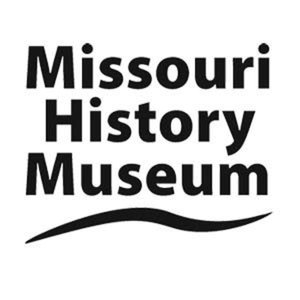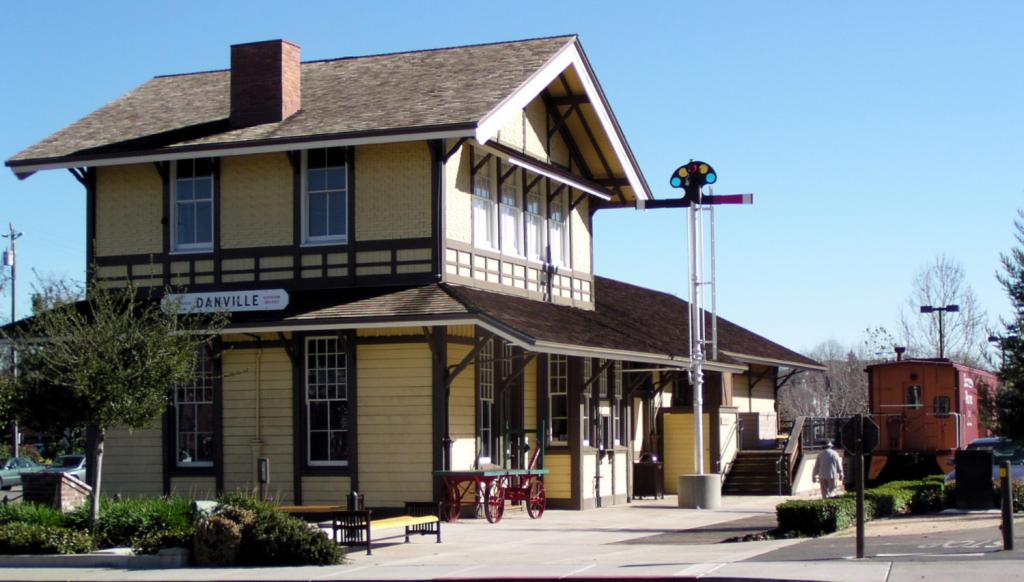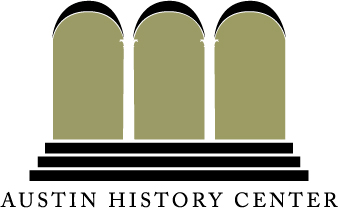Items in Remembering Lincoln that are transcribed.
from Apr. 17, 1865
W.J. Otto to George Harrington
-
Full Title
Letter signed W.J. Otto, Department of the Interior, to Assistant Secretary of the Treasury, [George Harrington], April 17, 1865
-
Description
States, "I have received your letter of this date, and will cause the clerks of this Department to be organized and form in procession on tomorrow, Tuesday, at 3 o'clock P.M. for the purpose which you mention. . . ." Regarding plans for Abraham Lincoln's funeral procession. Letter is on mourning stationery.
-
Transcription
Department of the Interior
April 17th 1865
Sir:
I have received your letter of this date and will cause the clerks of this Department to be organized and form in procession on tomorrow, Tuesday, at 3 o’clock P.M. for the purpose which you mention.
Very respectfully
W. J. Otto
The Assistant Secretary of the Treasury
[Transcription by McCaela Michas] -
Source
George R. Harrington Papers, Missouri History Museum Archives, St. Louis.
-
Rights
Please contact the Missouri History Museum at photo@mohistory.org for permission to publish this resource.
-
Tags
-
Cite this Item
Otto, W.J.. "Letter signed W.J. Otto, Department of the Interior, to Assistant Secretary of the Treasury, [George Harrington], April 17, 1865". Remembering Lincoln. Web. Accessed December 16, 2025. https://rememberinglincoln.fords.org/node/525
from Apr. 17, 1865
Letter signed W.J. Otto, Department of the Interior, to Assistant Secretary of the Treasury, [George Harrington], April 17, 1865
![Letter signed W.J. Otto, Department of the Interior, to Assistant Secretary of the Treasury, [George Harrington], April 17, 1865](https://rememberinglincoln.fords.org/sites/default/files/A0653_21.jpg)
-
Description
States, "I have received your letter of this date, and will cause the clerks of this Department to be organized and form in procession on tomorrow, Tuesday, at 3 o'clock P.M. for the purpose which you mention. . . ." Regarding plans for Abraham Lincoln's funeral procession. Letter is on mourning stationery.
-
Source
George R. Harrington Papers, Missouri History Museum Archives, St. Louis.
-
Rights
Please contact the Missouri History Museum at photo@mohistory.org for permission to publish this resource.
-
Creator
Otto, W.J.
-
Date
April 17, 1865
from Nov. 4, 1865
"Oh Captain, My Captain"
-
Full Title
"Oh Captain, My Captain"
-
Description
The noted poet Walt Whitman composed this poem in memory of Lincoln shortly after his assassination.
-
Transcription
I.
O CAPTAIN! my captain! our fearful trip is done;
The ship has weathered every rack, the prize we sought is won;
The port is near, the bells I hear, the people are exulting,
While follow eyes the steady keel, the vessel grim and daring:
But O heart! heart! heart!
Leave you not the little spot,
Where on the deck my captain lies,
Fallen cold and dead.
II.
O captain! my captain! rise up and hear the bells;
Rise up—for you the flag is flung—for you the bugle trills;
For you bouquets and ribbon'd wreaths—for you the shores a-crowding;
For you they call, the swaying mass, their eager faces turning;
O captain! dear father!
This arm I push beneath you;
It is some dream that on the deck,
You've fallen cold and dead.
III.
My captain does not answer, his lips are pale and still;
My father does not feel my arm, he has no pulse nor will:
But the ship, the ship is anchor'd safe, its voyage closed and done;
From fearful trip, the victor ship, comes in with object won:
Exult, O shores, and ring, O bells!
But I, with silent tread,
Walk the spot my captain lies,
Fallen cold and dead. -
Source
Walt Whitman Archive
-
Rights
This item may be reproduced and used for any purpose, including research, teaching, private study, publication, broadcast or commercial use, with proper citation and attribution.
-
Tags
-
Cite this Item
Whitman, Walt. ""Oh Captain, My Captain"". New-York Saturday Press. Remembering Lincoln. Web. Accessed December 16, 2025. https://rememberinglincoln.fords.org/node/517
-
Creator
Whitman, Walt
-
Publisher
New-York Saturday Press
-
Date
November 4, 1865
from Nov. 4, 1865
"Oh Captain, My Captain"
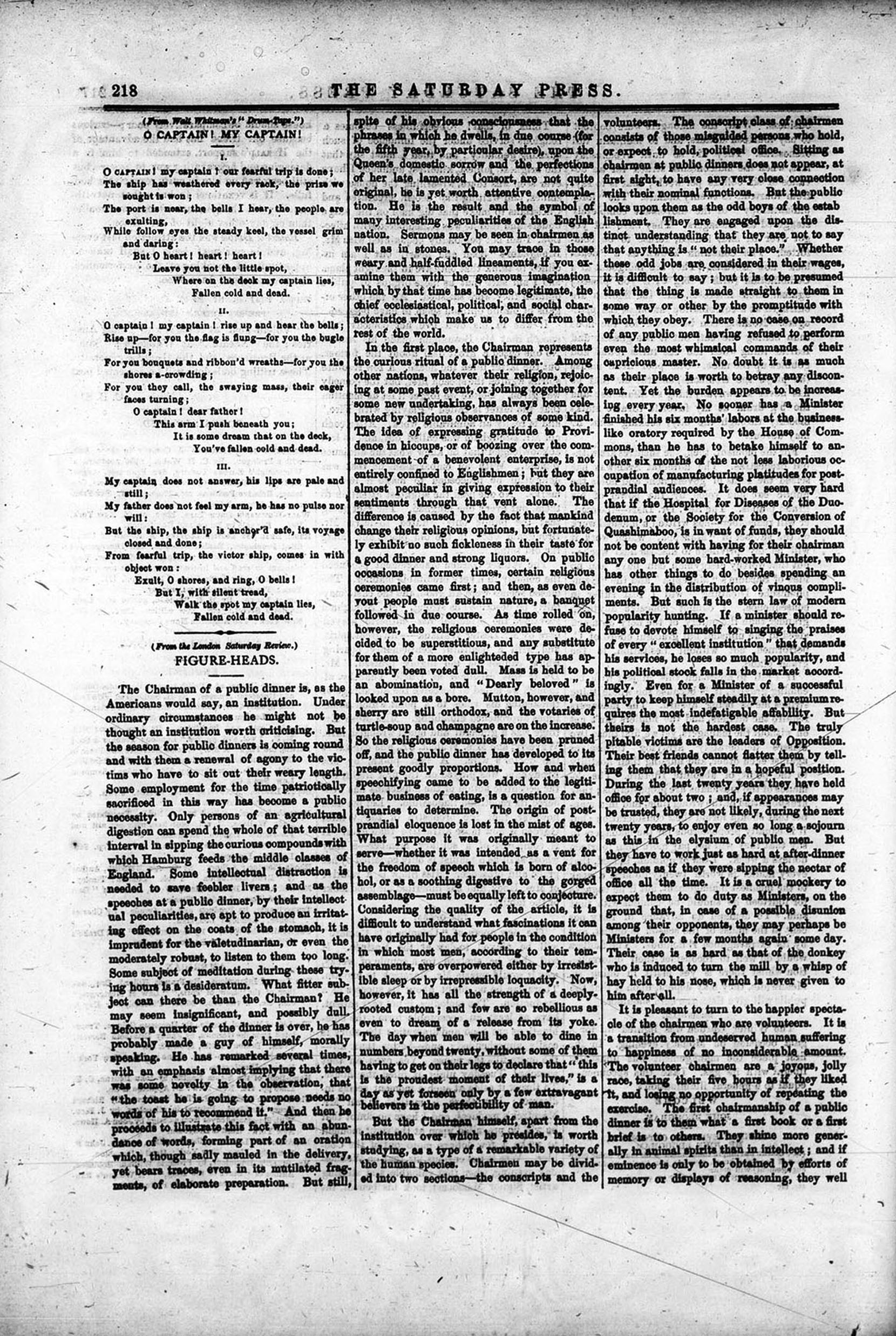
-
Description
The noted poet Walt Whitman composed this poem in memory of Lincoln shortly after his assassination.
-
Source
Walt Whitman Archive
-
Rights
This item may be reproduced and used for any purpose, including research, teaching, private study, publication, broadcast or commercial use, with proper citation and attribution.
-
Creator
Whitman, Walt
-
Publisher
New-York Saturday Press
-
Date
November 4, 1865
from Apr. 24, 1865
City Ordinance: Burial Place
-
Full Title
Springfield City Ordinance Providing Land for Burial Place
-
Description
The City Council of Springfield, Illinois instructed the Mayor to offer 28 acres of ground at Oak Ridge Cemetery for the burial of President Abraham Lincoln. They also authorized the mayor to appoint committees to procure lodging for those escorting Lincoln's body from Washington, to prepare for mourning drapery on buildings, and to regulate food vendors during the funeral.
-
Transcription
Monday Evening April 24th 1865
Ald. Coate. offered the following resolution which was adopted.
Resolved. By The city council of the city of Springfield. That the
mayor he and he is hereby instructed to offer twenty eight [[28]]
acres of ground on the south side. and. adjoining the present
enclosed Oak Ridge Cemetery. or any part of said cemetery they
may elect to the committee chosen to elect a site for a burial
plea for our late president.
”sg.” Coate.
Adopted
those voting in the affirmative being, Ald. Bishop. Broadwell.
Coate,Curry. Dallman. Myers,Rippon and Wohlgamuth
Those voting in the negative being Ald. Anderson. Brown. Morse
and Post.
On motion of Ald. Coate. The decision of the committee of Oak Ridge
Cemetery to put the vault in proper condition and other matters
preparatory to depositing the remain of the late president was approved.
Ald. Morse offered the following order which was adopted.
Ordered that the mayor [[?]] and [[?]] bids on the 10th day of
May at 12 Oclock M/ for fifty thousand 50.000 feet of two (2) inch
Oak plank for the use of the city the coming year and report the
Lowest bidder to the council
Sgd. Morse
Ald Morse offered the following order which was referred to Committee
On streets and alleys
Ordered that the street supervision put in a lot Gulbert in college
street at the intersection of Monroe and college street west side of
college street.
Sg. Morse
Ald. Curry, offered the follow which was adopted.
Ordered by the city council street supervision hereby
instructed to grade Lerois street on the east of Hutchinson county.
Sgt. Curry
Ald. Myers, offered the following order which has adopted.
Ordered that the re-letting of the stalls in the stands in the union.
Market House be postponed punting the 2nd Monday in may 1865.
The present occupiers being allowed to use the same at rates paid
by them the past year, for such time up to the re-letting of name.
Sgt. Myers
Ald. Myers, offered the following series of resolutions which were adopted.
Resolved the mayor appoint a committee of three to act in conjunction with
the committee appointed by citizens and invitation and reception to procure
suitable quarters for the escort attending the remains of late president
Lincoln from Washington.
Committee.
Ald. H, G, Myers
H, Hohlgemuth
S, P, Broadwell
Resolved 2nd that a committee of three be appointed to act in conjunction
with a committee appointed by Citizens on Drapery t.
Ald Burry,
Dallman,
Bishop,
Resolved 3rd that the committee of three be appointed to controll the
erection of booths for the sale of food during the period that may
be necessary to provide for the wants of those who attend the funeral of
Abraham Lincoln. That they are hereby instructed to issue permits
to no one except on such conditions and such places the prescribe
that said booths may be rected on their permits without license or charge
from the city. And that they are hereby particularly instructed to make
such conditions upon all person erecting Booths that no extortion will
be permitted, that said committee also make arrangements to provide
ice water at each places as they deem necessary.
Ald. Morse
Committee Bronson
Anderson
Ald. Myers, offered the following ordinance.
An ordinance to provide for the revision of the ordinances of the City
of Springfield.
Be it ordained by the City Council of the City of Springfield that Eugene
L. Grose, be and he is hereby appointed revisor; that it shall be the duty
of said revisor to prepare for publication as soon as may be a copy of the
ordinances of the City moro in force, with full and accurate indexes
[[therits]] and to super intend the printing of the name as the council
may hereafter direct.
[Transcription Team: Meryl S., Alishea P., Cael L., Jacob D.]
[New Hampton Middle School] -
Source
Springfield City Council Journal, volume 7
-
Rights
This item is in the Public Domain.
-
Tags
-
Cite this Item
Mayor and City Council of Springfield, Illinois. "Springfield City Ordinance Providing Land for Burial Place". City Clerk of Springfield, Illlinois. Remembering Lincoln. Web. Accessed December 16, 2025. https://rememberinglincoln.fords.org/node/516
-
Creator
Mayor and City Council of Springfield, Illinois
-
Publisher
City Clerk of Springfield, Illlinois
-
Date
April 24, 1865
-
Material
journal
-
Dimensions
30 cm x 46 cm
from Apr. 24, 1865
Springfield City Ordinance Providing Land for Burial Place
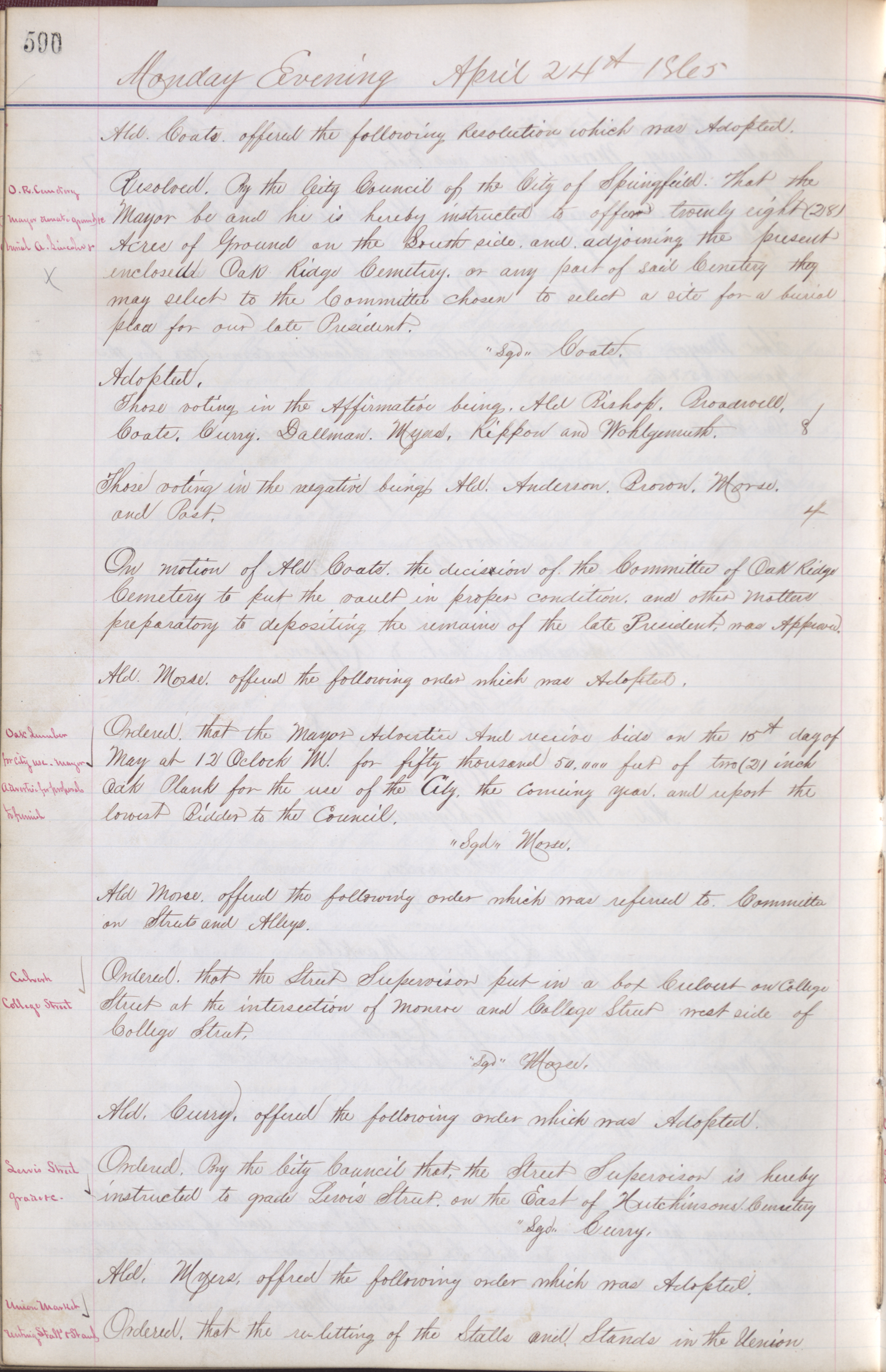
-
Description
The City Council of Springfield, Illinois instructed the Mayor to offer 28 acres of ground at Oak Ridge Cemetery for the burial of President Abraham Lincoln. They also authorized the mayor to appoint committees to procure lodging for those escorting Lincoln's body from Washington, to prepare for mourning drapery on buildings, and to regulate food vendors during the funeral.
-
Source
Springfield City Council Journal, volume 7
-
Rights
This item is in the Public Domain.
-
Creator
Mayor and City Council of Springfield, Illinois
-
Publisher
City Clerk of Springfield, Illlinois
-
Date
April 24, 1865
-
Material
journal
-
Dimensions
30 cm x 46 cm
from Apr. 24, 1865
Danson C. Tolman to sister
-
Full Title
Letter from Danson C. Tolman 8th Infantry to his sister April 24, 1865
-
Description
This is a letter from Danson C. Tolman (8th Infantry) of Watsonville, California to his sister, Miss Minott Johnan of West Camden, Maine, written on April 24, 1865. He wrote from San Francisco about mourning the death of the President, getting letters from home and his pay and bounty.
-
Transcription
Danson C. Tolman of Watsonville enlisted in Company 8, 8th Infantry, C.V. on November 17, 1865. He wrote from San Francisco on April 24, 1865 to his sister and brother-in-law, Mrs. Minott Johnan, West Camden, Maine.
Dear Brother & Sister:
I take a few moments to let you know that I am well and have not forgotten my friends at home. I hear [brother] John [also of Company A] is well. I leave here tomorrow noon [on the steamer Oregon] to join my company [at Cape Disappointment, W.T.] and when I get there, I will write again.
Everybody has been busy the past week mourning our great loss [The public funeral was Wednesday, April 19] & I don’t feel like writing yet. People here seem to think the war will be prolonged on the account of the death of the President, but do not know yet.
Lizzie did not answer our letters because I was coming home in a few days, and she waited for me to answer it. I wrote to Father a few days ago, and also I wrote soon after or enlistment, but I think the letters I sent then were lost in the indian troubles on the plains.
Our company is stationed at Cape Disappointment, W.T., which is at the mouth of the Columbia river on the north side.
If you have not got my letters I will again state that my company is A Co. 8th C.V. Inf. [Captain Clarence C. Smith], but letters sent to Watsonville will be forwarded by my wife.
In addition to the pay of the U.S., the State of California pays five dollars a month in gold coin to each soldier & a bounty in gold coin of $160 to three years men, So you see, soldiering is good business here where there is no war.
Give my love to all, your affectionate Br[other],
D.C. TOLMAN
-
Source
Private collection
-
Rights
This item may be reproduced and used for any purpose, including research, teaching, private study, publication, broadcast, or commercial use, with proper citation and attribution.
-
Tags
-
Cite this Item
Danson C. Tolman. "Letter from Danson C. Tolman 8th Infantry to his sister April 24, 1865". Remembering Lincoln. Web. Accessed December 16, 2025. https://rememberinglincoln.fords.org/node/514
from Apr. 24, 1865
Letter from Danson C. Tolman 8th Infantry to his sister April 24, 1865
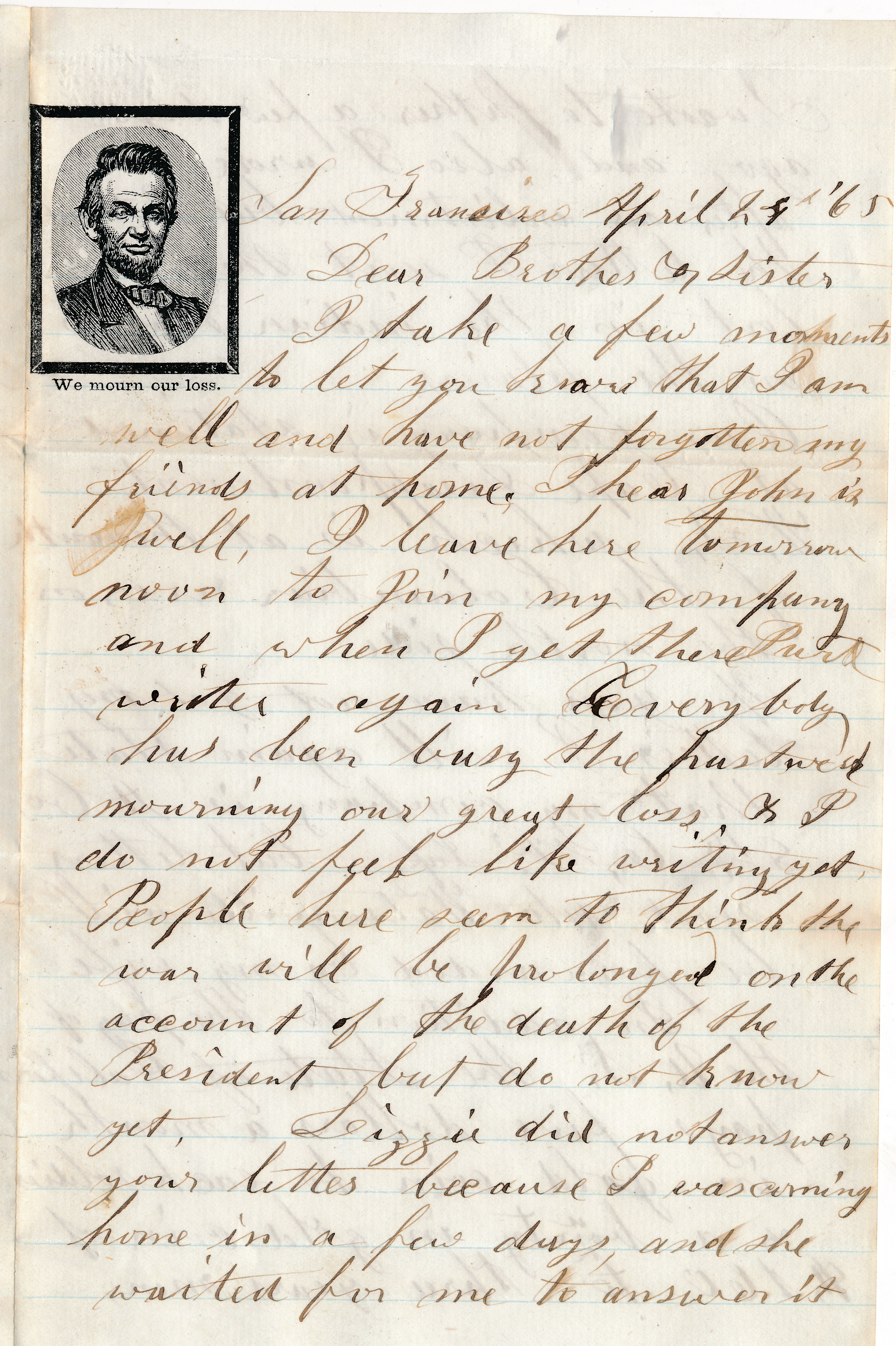
-
Description
This is a letter from Danson C. Tolman (8th Infantry) of Watsonville, California to his sister, Miss Minott Johnan of West Camden, Maine, written on April 24, 1865. He wrote from San Francisco about mourning the death of the President, getting letters from home and his pay and bounty.
-
Source
Private collection
-
Rights
This item may be reproduced and used for any purpose, including research, teaching, private study, publication, broadcast, or commercial use, with proper citation and attribution.
-
Creator
Danson C. Tolman
-
Date
April 24, 1865
-
Material
Paper
from Apr. 15, 1865
Eugene Carlos Bartholomew Diary Entry
-
Full Title
Eugene Carlos Bartholomew Diary Entry
-
Description
Entry in Eugene Carlos Bartholomew's journal dated Saturday, April 15, 1865.
-
Transcription
Sat. Apr. 15
Seward is not dead, but Lincoln died this morning. -
Source
Austin History Center, FP D.7 A.9, Diary No. 9
-
Rights
Use of this item for research, teaching and private study is permitted with proper citation and attribution. Reproduction of this item for publication, broadcast or commercial use requires written permission. For permission, please contact The Austin History Center at ahc_reference@austintexas.gov. For reproduction information please visit http://library.austintexas.gov/ahc/ordering-photos.
-
Tags
-
Cite this Item
Eugene Carlos Bartholomew. "Eugene Carlos Bartholomew Diary Entry". Remembering Lincoln. Web. Accessed December 16, 2025. https://rememberinglincoln.fords.org/node/500
from Apr. 15, 1865
Eugene Carlos Bartholomew Diary Entry
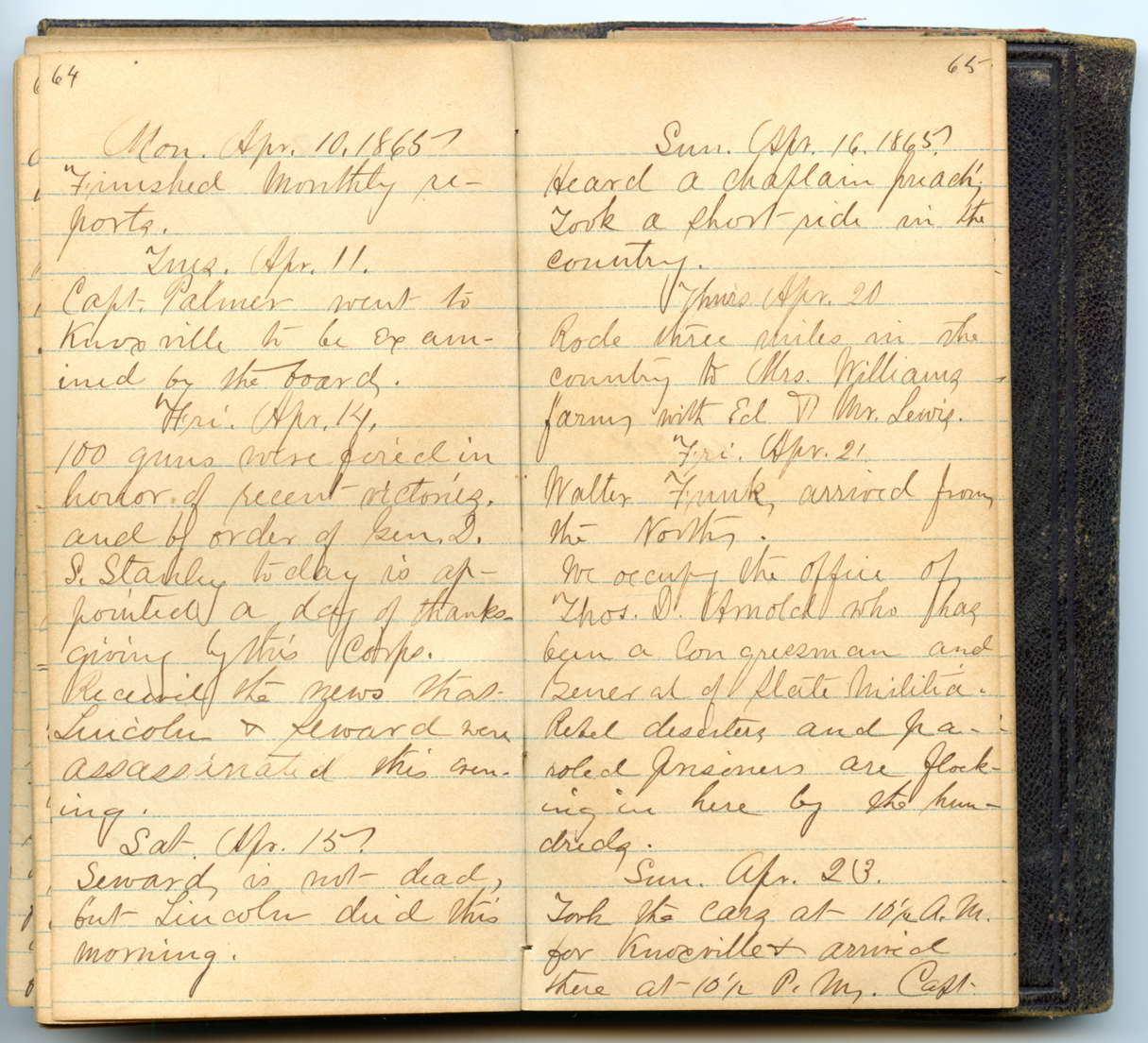
-
Description
Entry in Eugene Carlos Bartholomew's journal dated Saturday, April 15, 1865.
-
Source
Austin History Center, FP D.7 A.9, Diary No. 9
-
Rights
Use of this item for research, teaching and private study is permitted with proper citation and attribution. Reproduction of this item for publication, broadcast or commercial use requires written permission. For permission, please contact The Austin History Center at ahc_reference@austintexas.gov. For reproduction information please visit http://library.austintexas.gov/ahc/ordering-photos.
-
Creator
Eugene Carlos Bartholomew
-
Date
April 15, 1865
from Apr. 15, 1865
"Death of the president"
-
Full Title
"Death of the president"
-
Description
Article in the Second Edition of the Daily Morning Chronicle announcing the death of President Abraham Lincoln and commenting on the intensity of the nation's mourning.
-
Transcription
ABRAHAM LINCOLN IS DEAD!
If tears had audible language, a shriek would go up from these States which would startle the world from its propriety.
Strong men use the impressive language of women - TEARS. Women bow their heads in the dust. Children sleep troubledly.
Words are at this time weak and vain. Let us all, with heart and voice, say that
"This grave shall have a LIVING MONUMENT!" -
Source
Washingtoniana Microfilm Collection
-
Rights
This item may be reproduced and used for any purpose, including research, teaching, private study, publication, broadcast or commercial use, with proper citation and attribution.
-
Tags
-
Cite this Item
Daily Morning Chronicle. ""Death of the president"". Remembering Lincoln. Web. Accessed December 16, 2025. https://rememberinglincoln.fords.org/node/499
from Apr. 15, 1865
"Death of the president"
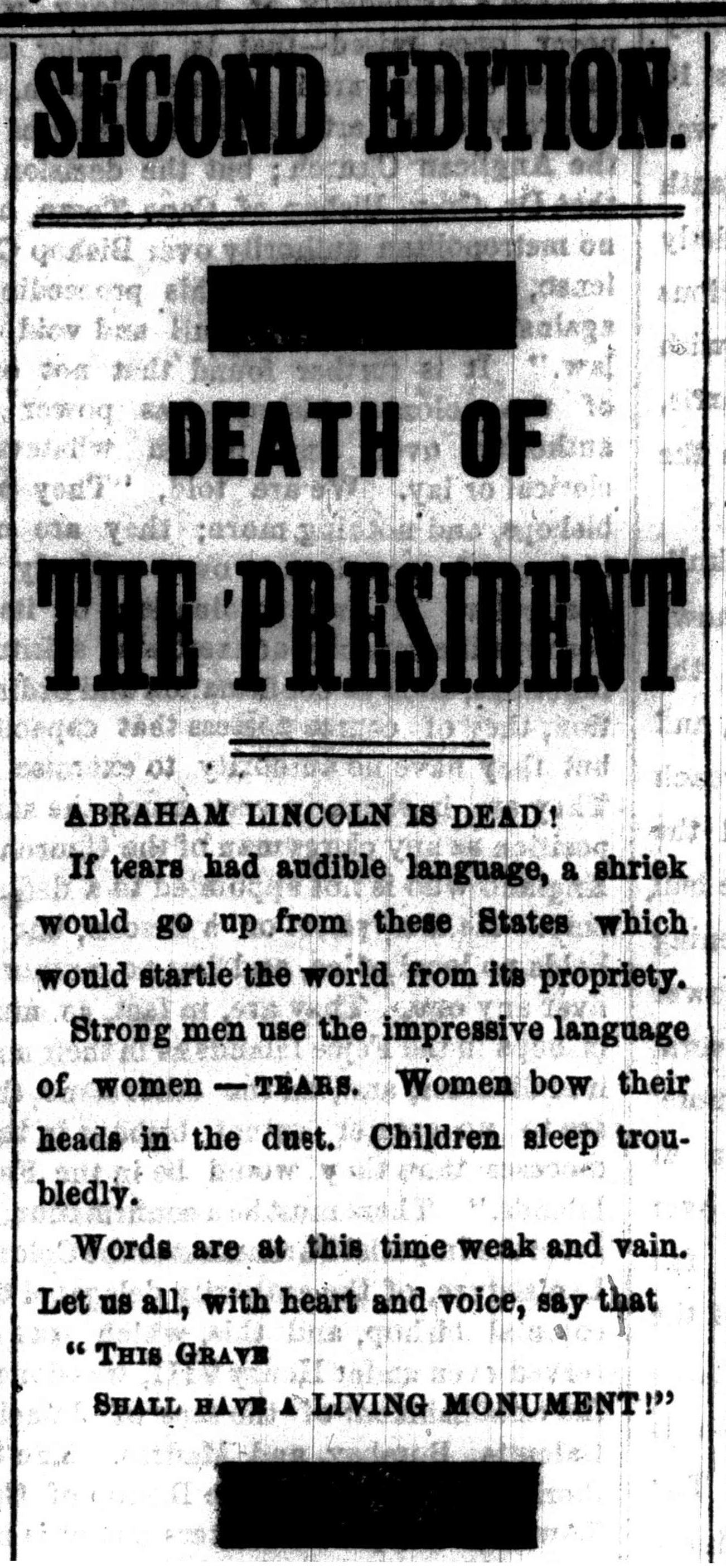
-
Description
Article in the Second Edition of the Daily Morning Chronicle announcing the death of President Abraham Lincoln and commenting on the intensity of the nation's mourning.
-
Source
Washingtoniana Microfilm Collection
-
Rights
This item may be reproduced and used for any purpose, including research, teaching, private study, publication, broadcast or commercial use, with proper citation and attribution.
-
Creator
Daily Morning Chronicle
-
Date
April 15, 1865
-
Material
newspaper
from Apr. 15, 1865
Removal of the President's Body
-
Full Title
"Removal of the body of the President to the executive mansion"
-
Description
Article describing the procession accompanying President Abraham Lincoln's body from the Peterson house to the White House. The article describes the procession as escorted by Union Light Guard calvary and military officers, as well as a large crowd, which descended on the Peterson house once the President's body was removed.
-
Transcription
Removal of the body of the president to the executive mansion.
Shortly after nine o'clock this morning the remains were placed in a temporary coffin, under the direction of Mr. Frank Sands, and removed to the Whtie House, six young men of the Quartermaster's Department carrying the body the house.
An escort of cavalry, (Union Light Guard,) under the command of Lieut. Jamison, accompanied the remains, which were followed by General Augur, commanding the Department of Washington; General Rucker, Depot Quartermaster; Colonel Pelouze, of the War Department; Captain Finley Anderson, A. A. G.; Hancock's corps; Captain D. G. Thomas, Clothing Depot; Captain J. H. Crowell, and Captain C. Baker.
The solemn procession moved slowly up Tenth street to G, and thence to the White House, the large crowd present along the route standing uncovered. Immediately on the guard being removed, a rush was made towards the house occupied during the night by the President, remaining about the entrance for some time. -
Source
Washingtoniana Microfilm Collection
-
Rights
This item may be reproduced and used for any purpose, including research, teaching, private study, publication, broadcast or commercial use, with proper citation and attribution.
-
Tags
-
Cite this Item
Daily Constitutional Union. ""Removal of the body of the President to the executive mansion"". Remembering Lincoln. Web. Accessed December 16, 2025. https://rememberinglincoln.fords.org/node/498
from Apr. 15, 1865
"Removal of the body of the President to the executive mansion"
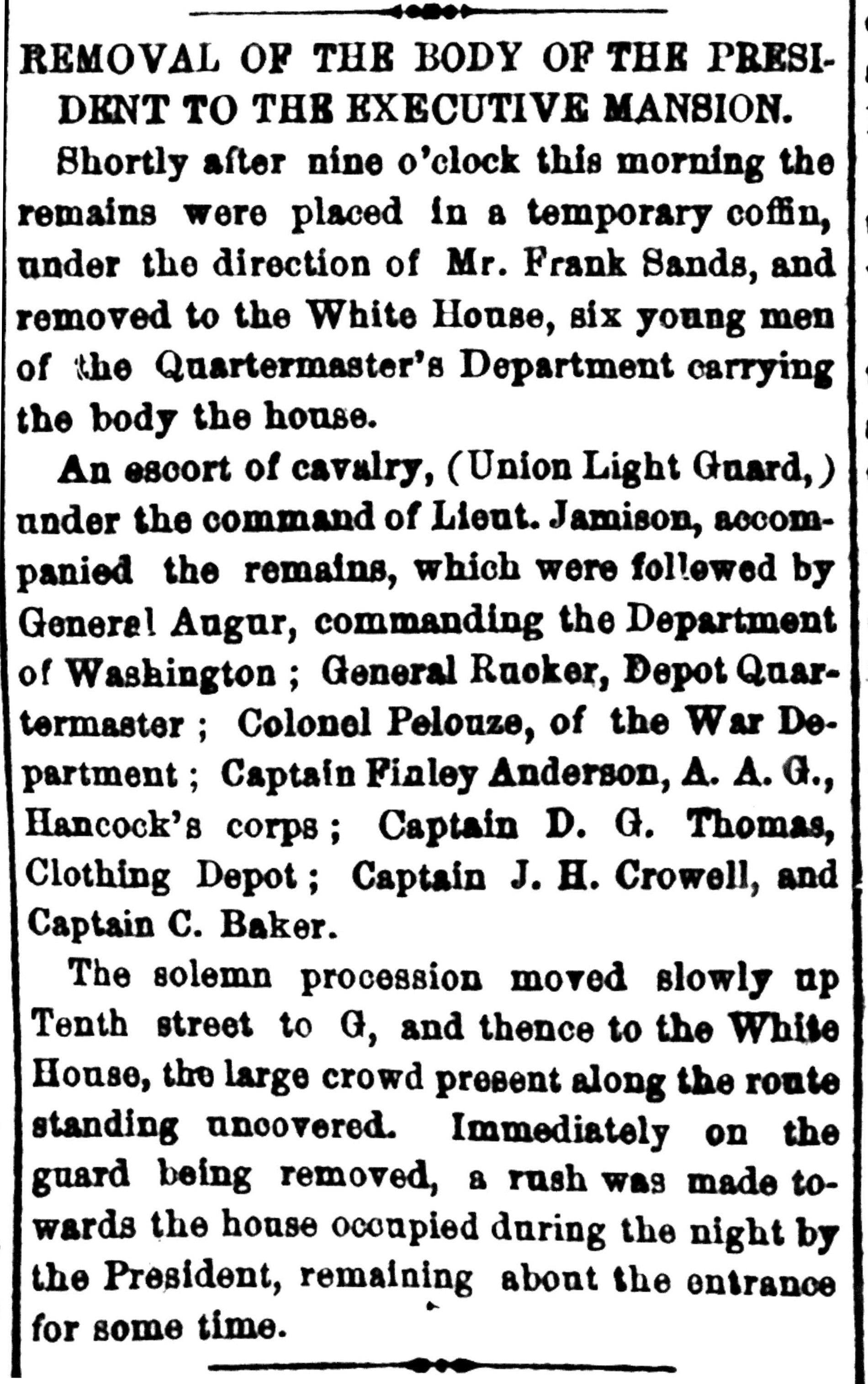
-
Description
Article describing the procession accompanying President Abraham Lincoln's body from the Peterson house to the White House. The article describes the procession as escorted by Union Light Guard calvary and military officers, as well as a large crowd, which descended on the Peterson house once the President's body was removed.
-
Source
Washingtoniana Microfilm Collection
-
Rights
This item may be reproduced and used for any purpose, including research, teaching, private study, publication, broadcast or commercial use, with proper citation and attribution.
-
Creator
Daily Constitutional Union
-
Date
April 15, 1865
-
Material
newspaper
from Apr. 15, 1865
"War Department report"
-
Full Title
"War Department report on the Health of Abraham Lincoln and William Seward"
-
Description
Publication of a report from Secretary of War Edwin M. Stanton to General John A. Dix issued at 3 a.m. on the morning after President Abraham Lincoln was shot and William Seward and his household were attacked. Stanton states that the president still lives but is not conscious, but that it seems Seward, his son Frederick Steward, and their household attendant may live. Stanton identifies John Wilkes Booth as the prime suspect in the President's assassination, but states that his connection to the Seward attack is uncertain. Stanton states that Chief Justice David K. Cartter is in charge of gathering evidence and Booth's horse has been found.
-
Transcription
War Department, Washington, D. C. 3 a.m., April 15
Major General Dix, New York:
The President still breathes, but is quite insensible, as he has been ever since he was shot. He evidently did not see the person who shot him, but was looking on the stage as he was approached behind.
Mr. Steward has rallied and it is hoped he may live. Frederick Seward's condition is very critical. The attendant who was present was stabbed through the lungs, and is not expected to live. The wounds of Major Seward are not serious.
Investigation strongly indicates J. Wilkes Booth as assassin of the President. Whether it was the same, or a different person that attempted to murder Mr. Seward, remains in doubt.
Chief Justice Cartter is engaged in taking the evidence. Every exertion has been made to prevent the escape of the murderer. His horse has been found on the road near Washington
Edwin M. Stanton, Secretary of War -
Source
Washingtoniana Microfilm Collection
-
Rights
This item may be reproduced and used for any purpose, including research, teaching, private study, publication, broadcast or commercial use, with proper citation and attribution.
-
Tags
-
Cite this Item
Daily Constitutional Union. ""War Department report on the Health of Abraham Lincoln and William Seward"". Remembering Lincoln. Web. Accessed December 16, 2025. https://rememberinglincoln.fords.org/node/497
from Apr. 15, 1865
"War Department report on the Health of Abraham Lincoln and William Seward"
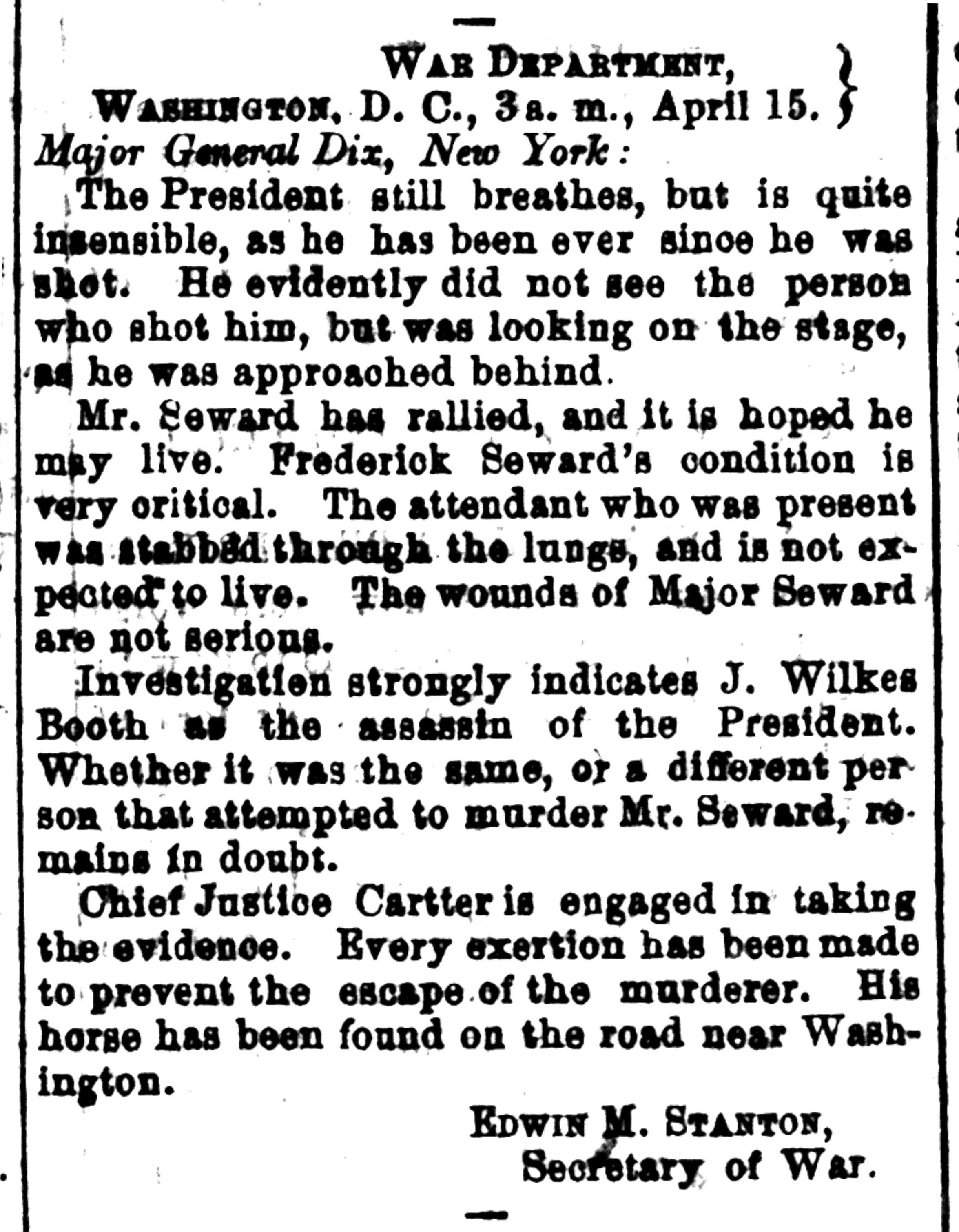
-
Description
Publication of a report from Secretary of War Edwin M. Stanton to General John A. Dix issued at 3 a.m. on the morning after President Abraham Lincoln was shot and William Seward and his household were attacked. Stanton states that the president still lives but is not conscious, but that it seems Seward, his son Frederick Steward, and their household attendant may live. Stanton identifies John Wilkes Booth as the prime suspect in the President's assassination, but states that his connection to the Seward attack is uncertain. Stanton states that Chief Justice David K. Cartter is in charge of gathering evidence and Booth's horse has been found.
-
Source
Washingtoniana Microfilm Collection
-
Rights
This item may be reproduced and used for any purpose, including research, teaching, private study, publication, broadcast or commercial use, with proper citation and attribution.
-
Creator
Daily Constitutional Union
-
Date
April 15, 1865
-
Material
newspaper
from Apr. 17, 1865
"Meeting of Colored Citizens"
-
Full Title
"Meeting of colored citizens in honor of the emancipation in the District of Columbia - The death of our late president"
-
Description
Resolutions of a meeting of colored citizens of the District of Columbia, which met on April 16, 1865, the third anniversary of emancipation in Washington, D.C. The group resolved to mourn the recent assassination of Abraham Lincoln and pay tribute to his role as emancipator. The resolution states that they believed Lincoln's should be seen as discipline for the nation's departure from the principles of equality present in the founding documents, including the Declaration of Independence. The group also sends its condolences to the Lincoln family and Willard H. Seward and his household, which were also attacked the night of the president's assassination.
-
Transcription
Meeting of colored citizens in honor of the emancipation in the District of Columbia - The death of our late president
Persuant to the notice that appeared in The Chronicle, the colored citizens of Washington met in the Fifteenth street Presbyterian church on the anniversary of the emancipation in the District of Columbia.
The meeting was organized by electing Mr. C. A. Stewart chairman, and Mr. W. H. Wormley secretary. Remarks were then made by several speakers, relative to the death of the late President of the United States.
The Chair appointed the following gentlemen a committee on resolutions:
Samuel J. Datcher, William Syphax, D. G. Muse, William A. Hughes, and John F. Cook
The committee, after a brief withdrawal reported the following resolutions, which were unanimously adopted, as expressive of the feelings of the meeting.
Whereas on the 14th of April, 1865, our late President, Abraham Lincoln, was foully assassinated; and, whereas, in him we, the colored people of the District of Columbia have lost an emancipator, benefactor, friend and leader: therefore be it
Resolved, That we, in common with all other loyal citizens of the Republic, have cause to mourn the sudden loss of one whose faithfulness to convictions of duty, and earnest execution of his realizations of the truth whose warm-heartedness, magnanimity, frankness, and honesty have endeared him to our hearts,
Resolved, That we devoutly feel this lamentable event to be a part of the chastening discipline to which the nation is being subjected for its departure from the original principles on which the Government was founded, the self-evident and unyielding truths of the Declaration of Independence, "that all men are born free and equal and endowed with the inalienable gift of life, liberty, and the pursuit of happiness."
Resolved, that we condole with his sorrowing wife and bereaved children in the terrible bereavement; and our sincree prayers shall be to Almighty God to sustain them in their hour of saddening trial.
Resolved, that we sincerely sympathize with the Hon. Secretary of State, and his son the able assistant Secretary, and their families, in their great suffering and aggravated injuries, and pray God for their speedy recovery to health.
Resolved, that the foregoing resolutions be published in the city papers, and a copy be transmitted to the family of our late president. -
Source
Washingtoniana Microfilm Collection
-
Rights
This item may be reproduced and used for any purpose, including research, teaching, private study, publication, broadcast or commercial use, with proper citation and attribution.
-
Tags
-
Cite this Item
Daily Morning Chronicle. ""Meeting of colored citizens in honor of the emancipation in the District of Columbia - The death of our late president"". Remembering Lincoln. Web. Accessed December 16, 2025. https://rememberinglincoln.fords.org/node/494
from Apr. 17, 1865
"Meeting of colored citizens in honor of the emancipation in the District of Columbia - The death of our late president"
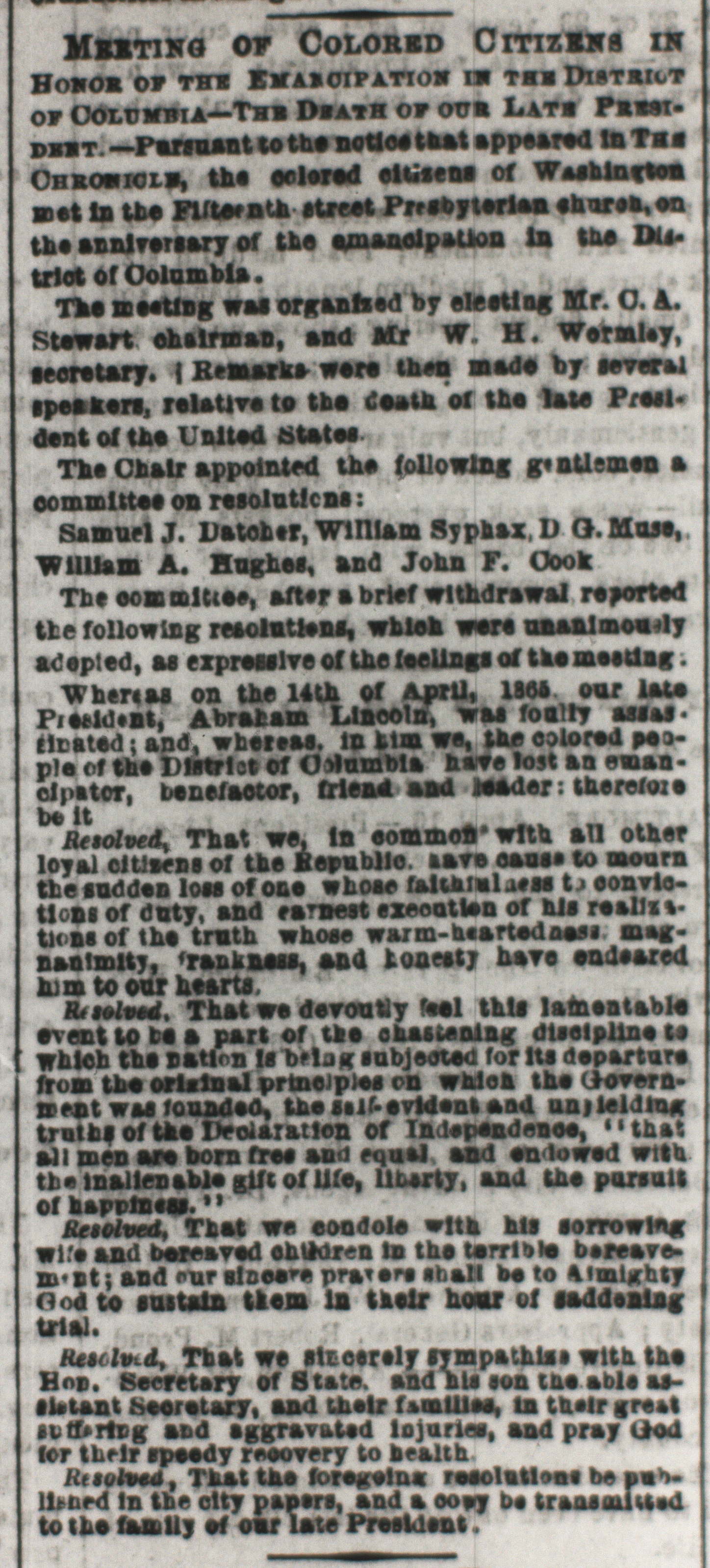
-
Description
Resolutions of a meeting of colored citizens of the District of Columbia, which met on April 16, 1865, the third anniversary of emancipation in Washington, D.C. The group resolved to mourn the recent assassination of Abraham Lincoln and pay tribute to his role as emancipator. The resolution states that they believed Lincoln's should be seen as discipline for the nation's departure from the principles of equality present in the founding documents, including the Declaration of Independence. The group also sends its condolences to the Lincoln family and Willard H. Seward and his household, which were also attacked the night of the president's assassination.
-
Source
Washingtoniana Microfilm Collection
-
Rights
This item may be reproduced and used for any purpose, including research, teaching, private study, publication, broadcast or commercial use, with proper citation and attribution.
-
Creator
Daily Morning Chronicle
-
Date
April 17, 1865
-
Material
newspaper
from Apr. 15, 1865
Important Order from D.C.
-
Full Title
"Important order by A. C. Richards, Superintendent of the Metropolitan Police"
-
Description
Reprinting of an official order from Washington, D.C. Metropolitan Police Department Superintendent Almarin C. Richards issued at 3 a.m. on April 15, 1865, the day after the shooting of President Abraham Lincoln's and the day of his death. The order requires all places in the city that sell liquor to be closed that day and night.
-
Transcription
Important order by A. C. Richards, Superintendent of the Metropolitan Police. The following was issued by Superintendent Richards at 3 o'clock this morning: In view of the melancholy events of last evening, I am directed to cause all places where liquor is sold to be closed during this day and night. The sergeants of he several precincts will see that this order is enforced. A. C. Richards, Superintendent.
-
Source
Washingtoniana Microfilm Collection
-
Rights
This item may be reproduced and used for any purpose, including research, teaching, private study, publication, broadcast or commercial use, with proper citation and attribution.
-
Tags
-
Cite this Item
Daily Morning Chronicle. ""Important order by A. C. Richards, Superintendent of the Metropolitan Police"". Remembering Lincoln. Web. Accessed December 16, 2025. https://rememberinglincoln.fords.org/node/489
from Apr. 15, 1865
"Important order by A. C. Richards, Superintendent of the Metropolitan Police"

-
Description
Reprinting of an official order from Washington, D.C. Metropolitan Police Department Superintendent Almarin C. Richards issued at 3 a.m. on April 15, 1865, the day after the shooting of President Abraham Lincoln's and the day of his death. The order requires all places in the city that sell liquor to be closed that day and night.
-
Source
Washingtoniana Microfilm Collection
-
Rights
This item may be reproduced and used for any purpose, including research, teaching, private study, publication, broadcast or commercial use, with proper citation and attribution.
-
Creator
Daily Morning Chronicle
-
Date
April 15, 1865
-
Material
newspaper
